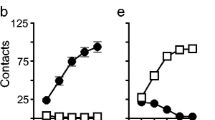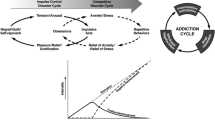Abstract
Rationale
Currently there is little research into the role of frustration in substance use disorders despite research showing that frustration tolerance in humans is associated with a lower likelihood of developing substance use problems, better outcomes in recovery, and fewer relapses.
Objective
In order to address this need, our studies use a rat model to focus on frustration-related behavior in natural reward and addiction-related behavioral procedures. Frustration is defined as when a subject is unable to achieve a reinforcer, receives less of a reinforcer than anticipated, or has to work harder to achieve a reinforcer.
Results
In these studies, bar-press durations increase when rats are in a state of frustration during self-administration of sucrose, fentanyl, or cocaine.
Conclusions
These data also show that average bar-press durations do not correlate with the number of bar presses, meaning that press duration is an independent measurement that represents a behavioral construct distinct from craving, which is typically measured with number of bar presses. Essentially, these results support that bar press durations can be used as a real-time measure of frustration as a 4th major facet of addiction-related behavior, adding to craving, impulsivity, and habit.





Similar content being viewed by others
Change history
22 February 2021
This article was updated due to omitted suppelemenatry materials.
References
Adelman HM, Maatsch JL (1955) Resistance to extinction as a function of the type of response elicited by frustration. J Exp Psychol 50(1):61–65
Amsel A, Roussel J (1952) Motivational properties of frustration. I Effect on a running response of the addition of frustration to the motivational complex. J Exp Psycol 43(5):363–366
Baars MY, Muller MJ, Gallhofer B, Netter P (2013) Relapse (number of detoxifications) in abstinent male alcohol-dependent patients as related to personality traits and types of tolerance to frustration. Neuropsychobiology 67(4):241–248
Capaldi EJ (1967) A sequential hypothesis of instrumental learning. In: The Psychology of Learning and Motivation 1. Academic, New York, pp 67–156
Capaldi EJ (1974) Partial reward either following or preceding consistent reward: a case of reinforcement level. J Exp Psychol 102(6):954–962
Capaldi EJ, Miller DJ (1988) Counting in rats: its functional significance and the independent cognitive processes which comprise it. J Exp Psychol Anim Behav Process 14(1):3–17
Crofton EJ, Nenov MN, Zhang Y, Scala F, Page SA, McCue DL et al (2017) Glycogen synthase kinase 3 beta alters anxiety-, depression-, and addiction-related behaviors and neuronal activity in the nucleus accumbens shell. Neuropharmacology 117:49–60
Ginsburg BC, Lamb RJ (2018) Frustration stress (unexpected loss of alternative reinforcement) increases opioid self-administration in a model of recovery. Drug Alcohol Depend 182:33–39
Podlesnik CA, Jimenez-Gomez C, Shahan TA (2006) Resurgence of alcohol seeking produced by discontinuing non-drug reinforcement as an animal model of drug relapse. Behav Pharmacol 17(4):369–374
Pyszczynski AD, Shahan TA (2013) Loss of nondrug reinforcement in one context produces alcohol seeking in another context. Behav Pharmacol 24(5–6):496–503
Quick SL, Pyszczynski AD, Colston KA, Shahan TA (2011) Loss of alternative non-drug reinforcement induces relapse of cocaine-seeking in rats: role of dopamine D(1) receptors. Neuropsychopharmacology 36(5):1015–1020
Ramirez-Castillo D, Garcia-Roda C, Guell F, Fernandez-Montalvo J, Bernacer J, Moron I (2019) Frustration tolerance and personality traits in patients with substance use disorders. Front Psychiatry 10:421
Vowles KE, McEntee ML, Julnes PS, Frohe T, Ney JP, van der Goes DN (2015) Rates of opioid misuse, abuse, and addiction in chronic pain: a systematic review and data synthesis. Pain 156(4):569–576
Zhang Y, Kong F, Crofton EJ, Dragosljvich SN, Sinha M, Li D et al (2016) Transcriptomics of environmental enrichment reveals a role for retinoic acid signaling in addiction. Front Mol Neurosci 9:119
Acknowledgments
The funding sources were not involved in study design, interpretation of data, writing of the report, or the decision to submit the article for publication.
Funding
This research has been funded by the National Institute on Drug Abuse grant DA047102 (TAG) and a pilot grant from the UTMB Center for Addiction Research.
Author information
Authors and Affiliations
Corresponding author
Ethics declarations
Conflict of interest
The authors declare that there is no conflict of interest.
Additional information
Publisher’s note
Springer Nature remains neutral with regard to jurisdictional claims in published maps and institutional affiliations.
Rights and permissions
About this article
Cite this article
Vasquez, T.E.S., McAuley, R.J., Gupta, N.S. et al. Lever-press duration as a measure of frustration in sucrose and drug reinforcement. Psychopharmacology 238, 959–968 (2021). https://doi.org/10.1007/s00213-020-05742-2
Received:
Accepted:
Published:
Issue Date:
DOI: https://doi.org/10.1007/s00213-020-05742-2




